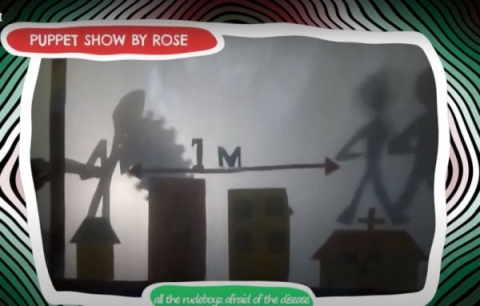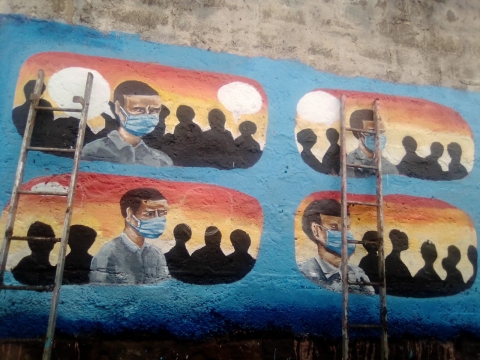
Status message
The Notification service is not correctly set.
The Action against Covid Transmission (ACT) Nairobi project developed arts-based resources to support Mukuru, an informal settlement in Nairobi, Kenya
15 January 2021
3 min read
Researchers from the University of Portsmouth have worked with community groups, youth workers and artists in Kenya to help produce public health messages to reduce the spread of Covid-19.
The Action against Covid Transmission (ACT) Nairobi project developed arts-based resources to support Mukuru, an informal settlement in Nairobi, Kenya. Mukuru is a densely populated community of over 100,000 households making public health measures such as social distancing challenging.
Public health messages in Mukuru are typically disseminated using a process known as sensitisation. In this context, sensitisation involves raising awareness around local health and wellbeing issues and sharing public health messages via socially and culturally relevant media such as graffiti and music. Engaging and effective sensitisation campaigns are a critical factor in limiting the spread of Covid-19 in these communities.

One of the murals created in Mukuru, as part of the ACT project.
Researchers from the University’s Faculty of Creative and Cultural Industries worked with local partner, Mukuru Youth Initiative and 21 community researchers, including youth leaders and activists, schoolteachers, artists, musicians and filmmakers, all of whom live and/or work in Mukuru.
The collaborative project helped to build relationships, share knowledge and enhance skills between creatives in Kenya and the UK. This was achieved through online workshops covering digital storytelling, cellphilming (cellphone and film production), comic creation, puppetry, music, citizen science and evaluation methods.
During the intensive four-month project, the following content was produced:
- A 32-page comic strip with over 4,000 copies being made available to the community via, libraries, youth groups, recreation centres and schools
- Cellphilms documenting the lived experience of informal settlement dwellers during the pandemic
- 12 puppet skits
- Four murals
- Two songs with music videos — Kaa Rada and You Can Get It
Through the project, we gained a greater understanding of the lived experiences of different communities and the challenges they face in the Covid-19 era. It highlighted the need for creative and effective public health messaging.
Dr Cressida Bowyer, ACT project lead
Community artists and youth activist groups continue to use the new techniques and school teachers are using the project outputs and skills training they received in their own teaching practice. Many of these methods are new to their classroom settings and are being received with great enthusiasm.
Dr Cressida Bowyer, project lead for the University of Portsmouth, said: “We're so pleased with what we've been able to produce with this response action project in just a few months, during lockdown. A special thanks to our Nairobi co-researchers and the UK team.
“Through the project, we gained a greater understanding of the lived experiences of different communities and the challenges they face in the Covid-19 era. It highlighted the need for creative and effective public health messaging."
ACT Nairobi extends the work of community-based participatory research projects AIR Network and TUPUMUE, involving a team of local lung health champions that the University of Portsmouth has been working with for three years.
This project also involved researchers from the Universities of Glasgow and York and other independent advisors. It was funded by the University of Portsmouth and the Stockholm Environment Institute at the University of York, through their allocation of funding from Research England QR Global Challenges Research Fund.
